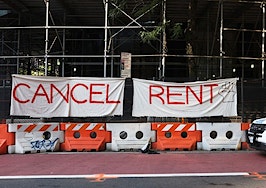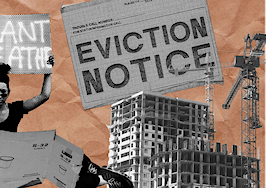It’s a new year, but millions of Americans’ situations have barely changed from 2020, as the burden of unemployment, past-due rent, and looming evictions still weigh heavy on their minds and pockets. Thirty percent of renters were unable to pay their rent on Jan. 1, with young, lower-income, and minority renters carrying double the amount of rent debt than their white counterparts.
In a survey of 4,000 renters, Apartment List discovered 28 percent of renters carry past-due rent debt, with 40 percent owing more than $1,000 to their landlords. Black renters have fared the worst during the pandemic, as 53 percent said they still have outstanding rent. Hispanic renters (38 percent) fared slightly better with Asian renters (27 percent) having the lowest rate among minority groups. Meanwhile, 21 percent of white renters reported having rent debt.
When generation and class are factored in, Millennials and Gen-Zers had the greatest share of rent debt (36 percent) and lower-income renters making under $25,000 were the most likely to carry past-due balances (38 percent). Conversely, Gen-Xers (19 percent), Baby Boomers (8 percent), and renters making more than $100,000 per year (17 percent) were the least affected.

Although late payment and rent debt rates have improved from the early days of the pandemic, the report said the situation is growing worse for “non-white renters,” with Black renters having the grimmest financial outlook for 2021.
“It is worth noting that rent debt has improved marginally since we last surveyed renters in October 2020; then, 33 percent reported having unpaid rent obligations, compared to 28 percent today,” the report read. “But for Black renters specifically, the problem has been worsening even as it improves for other racial groups.”
“The percentage of Black renters with rent debt has grown from 47 to 53 percent since October, while it has dropped from 56 to 38 percent of Hispanic renters, from 39 to 27 percent of Asian renters, and from 23 to 21 percent of white renters,” it added.
President-Elect Joe Biden’s proposal to extend the Centers for Disease Control’s eviction moratorium until September has assuaged eviction fears for the majority of renters, with 51 percent saying they’re “not at all concerned” about losing their housing. However, that trend falters with Black renters as 31 percent reported still being “very or extremely” worried about evictions — the most of any other race and twice the rate of white renters.

Unsurprisingly, rent debt and eviction concerns are highly correlated,” the report explained. “Over 80 percent of renters who are extremely concerned about an eviction owe their landlords money, and on average, they owe much more than less-concerned groups; 45 percent owe more than $1,000, compared to just 3 percent of those who are not worried about losing housing.”
“This highlights how eviction moratoriums may be short-term safety nets, but not sufficient solutions to deep inequalities,” it continued.
Like many other studies have pointed out, the focus on paying past-due and upcoming rent to avoid eviction has pushed renters to dramatically revise their budgets. Renters with rent debt are more likely to borrow money (49 percent vs 20 percent), dig into their savings (41 percent vs 32 percent), use credit cards (29 percent vs 21 percent), sell assets (26 percent vs 14 percent) and use retirement funds (15 percent vs 9 percent) to survive.
However, renters with rent debt were less likely to cut down discretionary spending (54 percent vs 58 percent), which Apartment List said is the “least disruptive.”

“The only action that is less common among holders of rent debt is the least-disruptive: a reduction in non-essential, discretionary spending,” the report read. “Many debt-free renters can make this small change without resorting to more-substantial sacrifices.”
“On the other hand, 85 percent of debt-burdened renters who cut back on discretionary spending also reported making one of the other changes on this list,” it added.
Looking forward, Apartment List researcher Rob Warnock said President-Elect Joe Biden’s pandemic plan will make or break the futures of millions of Americans who fear evictions, losing their job, and accumulating more housing-related and non-mortgage debt.
“A new presidential administration will be ushered in next week and has promised a number of lofty, long-term policy reforms aimed at curbing systemic inequalities in the housing market,” Warnock said. “But it also recognized the need for immediate aid to keep people housed, and is unveiling a new pandemic relief plan that will include larger direct payments and rent relief, among other initiatives.”
In addition to addressing shorter-term issues with eviction moratoriums and rent debt, Warnock said the Biden Administration must create solutions for long-term and deep-seated housing and jobs inequality issues that keep placing the burden on communities of color.
“…Pre-existing economic inequality is compounding the problem for minority renters,” he added. “People of color, who tend to work in occupations that are more prone to disease exposure and more susceptible to pandemic-related layoffs, are coming into 2021 with greater rent debt and more salient concerns about losing their housing once eviction protections expire.”





